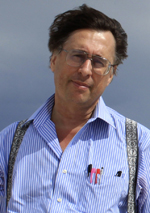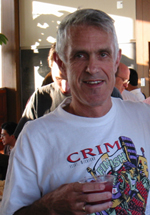
Washington University in St. Louis is hosting the Midwest Several Complex Variables Conference (SCV) May 11-14 in honor of Steven Krantz, PhD, professor of mathematics in Arts & Sciences at WUSTL, and John Erik Fornaess, PhD, professor of mathematics at the University of Michigan.
The conference is expected to bring to campus more than 80 mathematicians from around the country and the world.
The Midwest SCV conference is held regularly, albeit without a fixed schedule, and usually, but not always, in the Midwest. The regional name goes back to the beginning of the conference series, says Richard Rochberg, PhD, professor of mathematics at WUSTL and one of the conference organizers.
In the 1970s and ’80s, several of the most talented and energetic young researchers in the field held positions at Midwestern universities. But the once-regional conference has long since gone national and international.
This is the first time WUSTL has hosted the conference, which is sponsored by the National Science Foundation, Washington University and Rutgers University-Camden.
“Several complex variables is a research area in mathematics that, even by the standards of mathematical research, is unusually difficult to make accessible, even by analogy, to the non-initiated,” Rochberg says.
“However,” he says, “the research grew out of work in the 19th century and earlier on the theory of functions of one complex variable, functions such as sine and cosine applied to complex numbers (numbers that are a mix of ‘ordinary’ numbers and ‘imaginary’ numbers).
“By the early 20th century, it was understood that fundamentally new and very interesting phenomena arose when two or more variables were involved. Since then, the topic has become a major research area in mathematics with especially rapid growth in the United States. One of the reasons for the growth is that the topic interacts in fundamental ways with many of the most basic questions in algebra, analysis and geometry,” Rochberg says.
The program for the conference, including abstracts for the talks, is available online.
Conferences in the sciences are often held in honor of researchers who have been particularly productive in their fields when they reach milestone birthdays. Krantz is 60 this year and Fornaess is about to turn 65. The two will be feted at a banquet to be held Friday, May 13, at the Schlafly Tap Room.

Krantz
Krantz’s article “What is Several Complex Variables?” published in The American Mathematical Monthly in 1987 won the 1992 Mathematical Association of America’s (MAA) Chauvenet Prize, given for “an outstanding expository article on a mathematical topic.”
First awarded in 1925, the prize is named for William Chauvenet, a professor of mathematics at the U.S. Naval Academy.
“What they don’t mention on the MAA website,” Rochberg says, “is that in 1859 Chauvenet turned down an offer to become a professor at Yale and became a professor at Washington University instead. Three years later he was chancellor.
“Ridgley Hall bears a plaque with his portrait (also visible online). Our three postdocs also hold the title Chauvenet postdoctoral lecturer.”
Krantz, himself, who earned his PhD at Princeton University in 1974, joined the WUSTL faculty in 1986 and was chairman of the mathematics department from 1999 to 2004. He has been extraordinarily productive, says Rochberg, writing more than 170 research papers and 60 books.
His book, Function Theory of Several Complex Variables, first published in 1982 and now in its second edition, is the standard reference book and the standard graduate text in the SCV field. He has been a frequent lecturer and visiting professor and has held many editorial positions, serving most recently as chief editor of the Notices of the American Mathematical Society.
Krantz is also the author of Mathematical Apocrypha and Mathematical Apocrypha Redux, collections of anecdotes about famous mathematicians.
Two of the conference organizers, Siqui Fu, now of Rutgers University-Camden, and Estela Gavosto, now of the University of Kansas, are former doctoral students of Krantz.

Fornæss
John Erik Fornaess, who earned his PhD from the University of Washington in 1974, overlapped with Krantz at Princeton, serving on the faculty there from 1974 until 1991.
Rochberg remarks that Fornaess was an invited speaker at the 1983 International Congress of Mathematicians in Warsaw, considered a signal honor among mathematicians because invitations are sparingly given.
Fornæss is also one of the most insightful and productive researchers in SVC, says Rochberg. From his more than 150 research papers and several books, Rochberg singles out for special mention Lectures on Counterexamples in Several Variables, a monograph Fornaess wrote with a former doctoral student that has become one of the most influential texts in the field.
Registration for the conference is closed. For more information, contact the organizers at mscv2011@gmail.com.